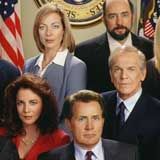As the world speeds toward the debut of Aaron Sorkin's new HBO drama, The Newsroom, this weekend, we're looking back at his previous highs and lows on television. Sports Night was fun enough, but when it comes to the really good stuff, there's no alternative to The West Wing.
Even now, it's hard to look at The West Wing as anything other than Aaron Sorkin's crowning achievement, if only from a time-management standpoint: He wrote or co-wrote a staggering 85 of the first 88 episodes (and it's more than likely that he had a strong hand in the remaining three, uncredited; he was rumored to have run that show with a near-dictator mentality in terms of the writing), creating a wonderfully witty, scarily smart show about what happened behind the party politics that everyone already has opinions about that stands up to multiple re-viewings more than a decade later. It's not just that the show was so good -- but it was, it is -- but that what made it so good in large part was the writing, and so much of the writing came directly from Sorkin in such a short period of time.
Perhaps oddly, it makes me nervous to talk about the politics of the show. While I might think that Sorkin treated "the other side" -- that is, Republicans, from the show's perspective -- with respect and avoided demonizing them, I shy away from wanting to state that as fact because it's possible that I'm blind to certain biases and faults because of the alignment of my views to those of the show. That said, even I was aware of the fantasy nature of Sorkin's party politics in terms of what his characters are able to achieve, and the way they approach matters; there's little doubt that the leads are idealists, and for the most part, they're rewarded for said idealism in the big picture, even if the small things constantly frustrate and undermine them. This isn't a show for people who want to see "how politics work," for sure; it's a show for people who want to watch a dream of how politics should work.
A lot of that comes from the characters; we want people in charge to be as smart and as able to take seemingly everything in their stride as Josiah Bartlett, with a team as able and charismatic as Josh Lyman, Toby Ziegler, Leo McGarry and CJ Cregg backing him up. They are, for all intents and purposes, superhuman, filled with the same doubts and insecurities as us, perhaps, but able to deal with them in better ways, able to triumph over adversity and make quips and wisecracks and literary references while doing it without breaking a sweat. It's an appeal that crosses to the show's many guest-stars, part-time characters and forgotten greats; Sorkin offered them all wonderful dialogue, and almost every single actor clearly relished the chance to deliver it.
(The actors, here, "get" Sorkin's writing and rhythm more than on Sports Night, in some indefinable way; I don't know if it's that Sorkin's writing is just that much sharper this time around, that the actors knew what to expect and had more time to get used to it, or whatever, but there's a naturalness about the theatricality in West Wing that there wasn't in Sports Night, somehow.)
The center couldn't hold, of course; Sorkin's writing became more variable as the show headed into its fourth season (Characters would be introduced and then disappear for weeks on end, as if Sorkin had forgotten to come up with anything for them to do) and apparently it was also becoming later and later, pushing NBC and Warner Bros. to force him off the show before the series' fifth year. The post-Sorkin West Wing is interesting to watch from a process perspective - or from a car-crash perspective, too - but it's not the same, in terms of tone, intelligence or even purpose. It's a show that wants to be someone else's dream, but doesn't quite know how to make that happen (Things get better in the show's final season, when it essentially becomes an entirely different show with new leads as the series pushes towards the election of a new president, but by then it's too late).
Sorkin's four years on The West Wing may not be everyone's idea of great political drama, or even great political television. But it is compelling, entertaining and moving, and on numerous occasions, will make you feel like a better person for watching it, even if it's only for the idealism it'll stir in you without even trying. The West Wing, when Sorkin's in charge, is just great.
The West Wing is available on DVD and iTunes, for those who want to check it out.

